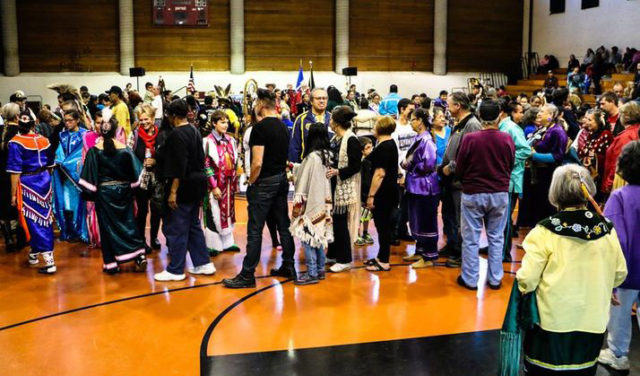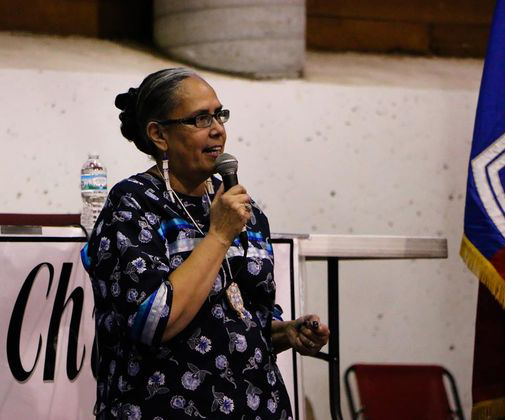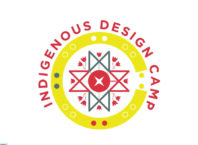
By Camille Erickson
Each year, the Minneapolis American Indian Center fills with adoptees, formerly fostered individuals and families for the Gathering For Our Children and Returning Adoptees Powwow. Now in its fifteenth year, the powwow is held on Saturday, Nov. 3 at the Minneapolis American Indian Center (MAIC) to once again provide a vital space for community healing and celebration.
“There are so many things that happen that day that are always miracles,” said Jacque Wilson, coordinator of the Bois Forte Urban Office and an organizer of the powwow.
The morning of the powwow, Sandra White Hawk (Sicangu Lakota) gathers with adoptees, formerly fostered individuals and birth relatives to visit with one another and share their experiences. White Hawk has been an organizer of the powwow since its beginning, and she remains an intrepid advocate for First Nations people impacted by foster care or adoption. Among her myriad roles, she serves as the director of First Nations Repatriation Institute.
Too often, conversations about the trauma caused by family separation and adoption remain buried under a veil of silence, explained White Hawk. Some attendees have never had the opportunity to attend a powwow or connect with the American Indian community. White Hawk works hard to foster a ceremonious and welcoming environment. “We mostly want to give them an opportunity to share in a way that they’ve probably never been able to,” White Hawk said.
For over a decade, a group of Native adoptees and formerly fostered individuals in Minneapolis have met each month to support one another. Many of them come out every first Saturday in November to welcome those returning to the circle. “Because of their healing as part of this community, they are there to greet our new people who have never been here before,” said White Hawk. Elders also share stories about the painful history of removal and cultural erasure in American Indian communities that ripped thousands of youth away from their families and tribal identity.
The space also welcomes and receives birth mothers. White Hawk hopes that the gathering can serve as a time for birth mothers to develop compassion for themselves and shed layers of guilt or shame. “For our mothers who lost [children] under all kinds of circumstances, our hope is that we continue to encourage them to be a part of our circle,” said White Hawk. “They gave us life and that was the most important thing.”
Following the morning gathering, the powwow begins in the auditorium. Community members are invited and encouraged to attend. The entrance of the color guard in the grand entry signals the celebration’s beginning. Adoptees and formerly fostered relatives follow in their stead, making their way back to the circle. In the eyes of White Hawk, the following “Wablenica ceremony” is dedicated to “taking care of the hearts of our relative who are making their way back to this circle and the hearts of our relatives who lost us.”
The ceremony can be laden with emotion, particularly grief, at the beginning, she said. But by the end, the adoptees and formerly fostered individuals stand in the circle and the community comes forward to welcome them. “Our hearts are just lifted,” she said. “Some people have never heard the phrase, ‘welcome home,’ and it makes them feel the acceptance and sense of belonging that is so needed for our people.”
For many, this is the day that healing begins.
Fifteen years of dedication from three Native women

courtesy of Red Lake Nation News.)
The powwow started in 2003 with a call for healing. And Jacque Wilson, Sandra White Hawk and Tina Knafla are three women whose lives have been touched both personally and professionally by the impacts of American Indian adoption and foster care. Throughout their lives of service, they each have seen and felt the intergenerational trauma present in their communities. “There is so much pain around adoption and the loss of children because of the Indian adoption era and the boarding school era,” said Knafla, who in 2003, worked with Hennepin County as an ICWA adoptions recruiter. “I really felt like we needed to address that.”
In addition to the forcible placement of American Indian children into abusive boarding schools beginning in the 1860s, the Child Welfare League of America instituted the Indian Adoption Project from 1958 to 1967. The Bureau of Indian Affairs and the U.S. Children’s Bureau were also complicit in this program. The government ripped American Indian children away from their tribes and families and placed a vast majority of them into non-Native foster or adoptive homes. According to a 1976 surveys commissioned by the Association on American Indian Affairs, 25 to 35 percent of American Indian children were removed from their families between 1941 and 1967.
After exhaustive calls for justice from Native communities, The Indian Child Welfare Act (ICWA) was enacted in 1978 by Congress. It requires the state to place American Indian children experiencing foster care with family or relatives as often as possible. But only about half of Native children in foster care in Minnesota find Native homes, according to the Minnesota Department of Human Services. And the trauma from these twentieth century policies linger in the lives of adoptees and their communities who still reckon with family separation.
After attending a National Indian Child Welfare Association conference in Duluth in 2003, Knafla felt compelled to expand opportunities for healing with the support of the county. She began reaching out to community agencies and colleagues, including White Hawk and Wilson, to uplift resources for Native communities processing the impacts of family separation. The three women believed that a powwow would provide a needed space for healing and celebration.
Organizers obtained the sponsorship of Hennepin County and the Minnesota Department of Human Services, among other community agencies. This support continues to keep the powwow strong and sustained. “That collaboration is very unique between Hennepin County and the community,” said Knafla. “We’re still here, 14 years strong.”
The year the powwow began, Wilson worked in the juvenile justice courts representing state tribes in child welfare cases. She yearned to see foster families participating in more culturally-relevant activities. In her eyes, the powwow would provide an opportunity for foster youth to establish a connection to their identity.
“The more the children know about who they are and where they come from, the less traumatic it is for them,” explained Wilson. “It also gives them a place to look for answers when they become older.”
Although her job has since changed, Wilson continues to support people who she said have been away from their families or tribes for a generation or more. The gathering would also be an opportunity to connect families with foster care agencies to expand the availability of culturally-involved, Native homes for youth still in foster care.
“This powwow is still important to me because that trauma has not gone away on many levels,” she said. “It’s always important for [returnees] to learn who they are, because in order to be a full human being, it’s best that you know who you are, where you came from, or your people.”
Adoptees from all over the country attend the powwow in Minneapolis. “We’re trying to share what we’ve learned and get other tribes and communities to recognize their returning adoptees and birth mothers in whatever kind of ceremonies they want to do,” said Wilson.
Organizers of the powwow envision a time when reservations and Native communities across the country create their own spaces that encourage returning relatives to heal.






